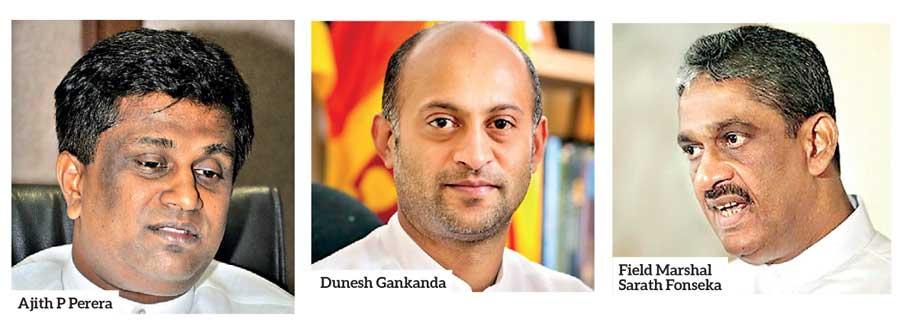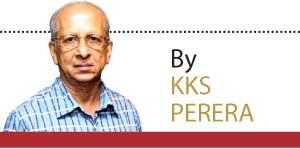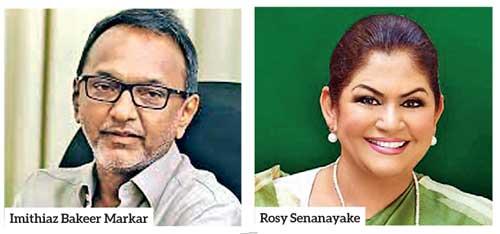Reply To:
Name - Reply Comment

Impeachment against President Donald Trump was approved by the Congress [Democratic-lead House of Representatives] on December 18. However, the majority in the Senate, who are Republican loyalist of Trump, acquitted him last Wednesday. Will the UNP’s WC loaded with Ranil loyalists which meets today endorse the plans of Sajith faction or drop the pro-Sajith Parliamentary group’s decision to proceed with reforms? 
Daily Mirror of February 6, states that, “Some members from Sajith’s faction told us that Ranil Wickremesinghe was ‘hell-bent’ in retaining UNP leadership despite a majority in the party and its allies calling for a leadership change. Thus, it is difficult for Sajith to ‘reason’ with Ranil as they believed he was working against the party agenda.” This came soon after the Sajith faction led party Parliamentary group meeting held on the previous day where it was unanimously decided to appoint Ranjith Madduma Bandara as the Secretary of the new UNP led alliance.
"Ranil was ‘hell-bent’ in retaining UNP leadership despite a majority in the party, allies calling for leadership change"
Senior members have vented their frustration at the growing rift between the two factions saying this could impinge on party performance at the April elections. These members wants the two leaders to leave aside their differences and work together. The ratification of Madduma Bandara’s appointment by the new Working Committee where Ranil faction holds the majority, is due to take place today. The news item continued, ‘Commenting further, the party sources have said, “Premadasa refused to attend working committee meetings after the party suspended the membership of four from the central committee while he and his camp were meeting separately to discuss election work. Decisions being made by Sajith’s faction were not being conveyed to Wickremesinghe and his camp which resulted in a deadlock between the two groups.”
It would be interesting go to back in time two decades to the beginning of the millennium, [February 2000] when the UNP’s gradual change to unpleasant circumstances, commenced with Leader’s defeat at Presidential election held on December 21, 1999. The membership rose against Ranil, despite the fact that the unexpected loss was caused by the massive sympathy vote in favour of Chandrika Kumaratunga due to her narrow escape with a severe eye injury. She appeared heavily bandaged on TV and broke down creating an emotional wave that  swept over the electorate a day before the election. Up to that point, all surveys by local and foreign agencies confirmed victory for Ranil by a thin margin. However, the sections hostile to leader who waited for an opportunity to fix the man in case of a loss, went to town demanding his resignation. [those in the UNP who are accusing him of 29 losses should be mindful of the fact that a Ranil victory in 1999, as predicted 20 years ago would have made the UNP the most stable and powerful political entity under him].
swept over the electorate a day before the election. Up to that point, all surveys by local and foreign agencies confirmed victory for Ranil by a thin margin. However, the sections hostile to leader who waited for an opportunity to fix the man in case of a loss, went to town demanding his resignation. [those in the UNP who are accusing him of 29 losses should be mindful of the fact that a Ranil victory in 1999, as predicted 20 years ago would have made the UNP the most stable and powerful political entity under him].
Imithiaz Bakeer Markar, Ajith P. Perera, Rosy Senanayake, Field Marshal Sarath Fonseka, and Dunesh Gankanda were thrown out of Working Committee by the party leader. This is a repetition of his sacking Five seniors, Nanda Mathew, Wijeyapala Mendis, Dr. Sarath Amunugama, Chula Bandara, and Susil Moonesinghe, in the year 2000 for criticizing Leader. The then Supreme Court’s unanimous judgment sent shock waves across the UNP when it delivered a decision in favour of the dissidents, saying that their expulsion was not valid as the UNP had failed to comply with the principles of natural justice.
Ranil responding to comments by seniors was of the view that the party does not intend to go into this matter and waste time with witch-hunting as it is facing more serious problems at that time. One of the rebel leaders, Susil Moonesinghe speaking on behalf of his colleagues called for more democracy within the party. “The party leader in expelling five members shows a decline in the democratic ideals in the party”, he said. “The party should look at the UNP’s dictatorial constitution; the system of appointing the whole working committee by the party leader should be changed”. Moonasinghe wished that while the leader appointed 25 persons, the other balance should be by the national executive council. Drastic changes in the party constitution a must he said. “The members are not given a free hand to express their views, contributing towards the weakening of intra party spirit of democracy.”

‘Consequent to the judgment which held that our expulsion was illegal, we have been restored to our membership with all the rights and privileges’ they wrote jointly to the then Party Chairman Karu Jayasuriya, who carried on with an attitude of nonchalance for over two decades since then.
Wijeyapala Mendis, the rebel group leader sent a written statement to the General Secretary of the party announcing his idea of contesting Ranil for the party leadership.
Extract from letter:
“… our party has hit the lowest point in recent times under the leadership of Mr. Ranil Wickremesinghe, therefore I have decided to accept numerous requests from UNPers … and offer myself as a candidate for the leadership.. ..I request that all modalities be initiated without delay for the conducting of an election for …for which I have announced my candidature.”
The same evening the anti-Ranil group of UNP met at Buller’s Road Temple of Ven. Elle Gunawansa Thera to decide on the next step, where it was confirmed that more members have expressed their willingness to join them calling for the resignation of Ranil as party leader. In the meantime, he entrenched his position in the party with constitutional amendments so that he faces no threats in future. The leader’s status in the UNP was fortified with rock-hard solidness that lasted the next twenty years, and as things are happening, he will continue till the end of this decade as well, or even beyond that. [Ranil loyalist Vajira says ‘leader for life’] The present rebels are much weaker personalities than the year 2000 squad albeit Imithiaz Bakeer Markar, the son, who carries the legacy of Late Bakeer Markar, former speaker and the respected leader: analysts think other four can hardly make any significant impact in the party. The leader is not taking them seriously either; perhaps he expects voters at the April election to decide the fate of rebels.
"Both Ranil and Sajith are yet to make a serious attempt at holding talks for the benefit of all factions"
UNP continues on the path heading to a major split despite the compromises at today’s WC. Last week it allowed Sajith Premadasa to be head of the new UNF alliance and to nominate him prime ministerial candidate, while Ranil Wickremesinghe continues as the party leader. Party seniors say, in spite of several requests for a permanent settlement, both Ranil and Sajith are yet to make a serious attempt at holding talks for the benefit of all factions.
In 2000, immediately after the SC judgment, the UNP started interviewing nominees for the next elections. The sitting members also were asked to appear before a nomination board headed by Karu Jayasuriya to seek nominations, ‘…as there had been complaints against them’, a party communiqué stated; a repetition is predictable. What Sajith loyalists can expect from a man who has placed his trust in the old Arabic Proverb, “Let the dogs bark—Caravan rolls on”.